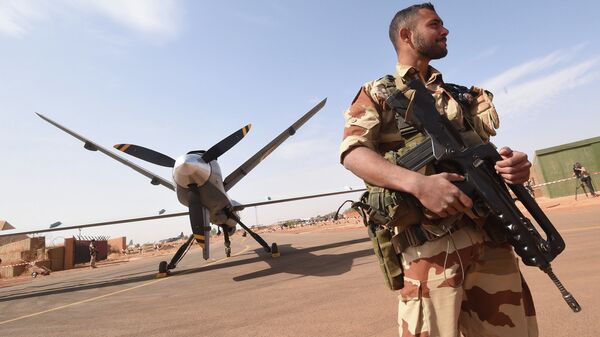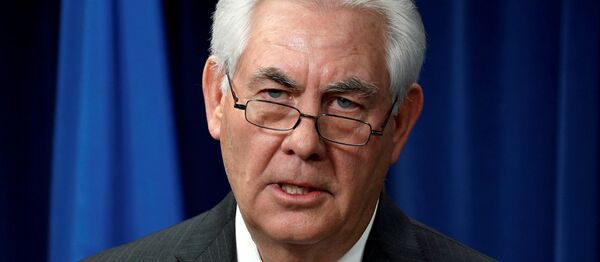French political analyst Leslie Varenne, director of the Institute for Monitoring and Research of International and Strategic Relations (IVERIS), analysed the situation for Sputnik.
Although media attention is focused on the Covid-19 pandemic, the press widely covered the statement of the French Armed Forces Minister Florence Parly.
However, the US decision to continue supporting France in Operation Barkhane is news only for those who believed that the US would reduce the number of troops in Africa in general and withdraw its forces from the Sahel region in particular, as The New York Times reported, and, in due course, US Secretary of Defence Mark Esper made that clear.
The statement is even less surprising if we recall that everything was decided back on 8 March, when Washington appointed its first envoy to the Sahel Peter Pham.
The Cat-and-Mouse Game Continues
If there is an element of surprise here, it is not that the Americans remain in the region but that it was the French minister of the Armed Forces who revealed it and not Peter Pham.
Moreover, no US official has confirmed or denied the statement made by Florence Parly in an interview with the French regional edition on April 24. This is despite the fact that the Chairman of the Joint Chiefs of Staff General Mark Milley said on 17 January that the US would decide on its presence in the Sahel in two months. Ten weeks later, the United States has not said a word about it.
The very wording of the French minister is also surprising. Florence Parly didn't say the US would stay in the region. She said that “they have delayed the decision to withdraw”. This significant difference in wording suggested that the US itself has not yet made up its mind. Holding Damocles' sword over the French is a good way to make an ally compliant, especially when the latter is pursuing “at the same time” an unpredictable policy. It is all the easier and more effective when that ally is dependent on American logistical support for all its external military operations.
A Matter of Sovereignty
Indeed, the US clearly understands that France depends on them. Do they play on that dependency? According to Deputy Undersecretary of Defence for International Security, Kathryn Wheelbarger, no. During a hearing in the House of Representatives on 10 March, she said that the issue had been considered with the French authorities.
"What we've tried to do is to encourage them to speed up their decision-making processes for acquiring these capabilities, so that they're no longer dependent on US support."
Would Washington be concerned about France's strategic independence? If so, it would be a real change in doctrine. Or is it just a way to encourage the French to "procure capabilities" made in the USA?
As a result of the health crisis and its share of shortages, French President Emmanuel Macron seems to have realised the importance of these issues. On 30 March, he declared that he wanted to rebuild "national sovereignty" by relocating "strategic industries". Will the French army benefit from this windfall? Nothing is less certain, given the budget deficit, which according to the most optimistic forecasts is expected to reach 9% in 2020.
While some efforts have been made, notably with the acquisition and arming of UAVs, France is still very dependent on the United States for in-flight refuelling, logistical transport as well as surveillance and reconnaissance intelligence.
British Fair Play
France is also greatly assisted by the British Air Force, which has provided the French with not only three Chinook helicopters, heavy assault vehicles, but also some 100 pilots for Operation Barkhane.
But like Washington, London did not comment on the statement by the French minister of the Armed Forces. Their commitment was due to end in August 2020, will it continue beyond that? The question remains open.
Furthermore, the British have promised in August 2020 to form a 250-strong rapid intervention operational brigade in support of MINUSMA (United Nations Multidimensional Integrated Stabilisation Mission in Mali).
On the other hand, they refused to participate in Takuba, a new coalition of European Special Forces created at the initiative of France, which is not particularly successful with partners. However, French President Emmanuel Macron cannot blame Boris Johnson for not playing the European solidarity card, since the British have signed up for Brexit.
For What Purpose?
Therefore, the British may still be helping with Operation Barkhane but they are not going to participate in Takuba. As for the US, they are in no hurry to dispel doubts. They are objectively not interested in leaving the Sahel.
Their presence in the region, including their participation in Operation Barkhan, costs them $45 million – a drop in the Pentagon's huge budget of $738 billion for 2020, without taking into account, of course, all the operations covered by defence secrecy, which by their very nature cannot be disclosed.
Keeping a foot in the region, the US can also undermine the plans of Russia and China and put pressure on France, which is also a member of the Security Council, which is its raison d'être.
There is every reason for them to remain, as NATO wishes to make Africa one of its priorities. However, the world has reached such a level of volatility that it is impossible to predict the intensity of future crises and the upheavals they will cause. From that standpoint, the uncertainty remains.
Civilians die under the bullets of terrorists, militias, and sometimes soldiers of national armies. Hundreds of thousands are displaced. Kidnappings are increasingly frequent, including political figures, as happened in Mali during the election campaign.
National armies are exhausted and at their limit. The people are suffering and do not see the end of the tunnel... Only the war profiteers are benefiting. To say that peace has not been won is an understatement.


